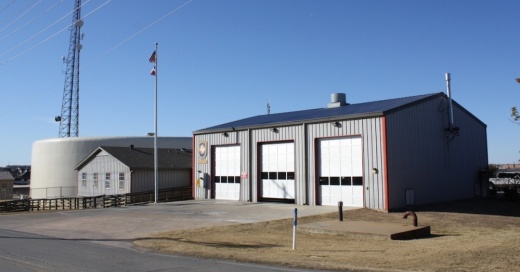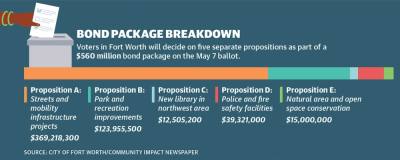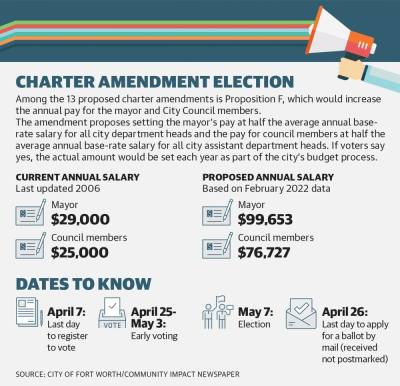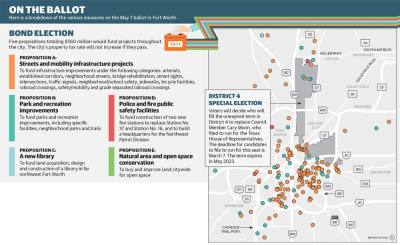Fort Worth is the nation’s 12th largest city and among the fastest-growing large cities, according to census population estimates released last year.
To help keep up with that growth, the city is proposing $560 million worth of capital projects that will go before voters May 7. Also on the ballot will be 13 charter amendments, including one to increase annual pay for the mayor and council members. In addition, a special election will be held to fill the unexpired term for City Council District 4, which includes Northeast Fort Worth.
The $560 million in capital improvements across the city will be listed as five separate bond measures on the May 7 ballot. The projects include street improvements, mobility projects, parks and recreation upgrades, public safety facilities, a new library in northwest Fort Worth and preservation of open space.
“The goal is for growth to pay for growth,” District 4 Council Member Cary Moon said during a Feb. 8 meeting where council voted unanimously to call the bond election.
The bond measures, if passed, would not increase the city’s property tax rate, city officials said.
Nearly two-thirds of the bond package would fund road improvements and mobility projects throughout the city. The bond measure targets 14 arterial roads, 12 intersections and about 110 neighborhood streets along with a host of other projects.
Other bond measures propose replacing Fire Station No. 37 at 4721 Ray White Road in Keller and constructing a new Northwest Patrol Division headquarters for police. The city also proposes more than $12.5 million to fund land acquisition, design and construction of a new library in far northwest Fort Worth.
Also calculated in the price tag for each project is a 2% allocation for public art.
Filling the District 4 seat
Voters in May will also select a replacement for Moon, whose seat became open when he announced his run for the Texas House of Representatives. Whoever is elected to replace Moon on council will serve until the term expires with the May 2023 election, according to city documents. District 4 includes the area of northeast Fort Worth.
Moon was first elected to council in 2015. He said he has developed a “very effective record” throughout his seven years in office.
Whoever takes his spot, Moon said, will have huge shoes to fill and represent about 115,000 people.
“It’s a full-time job,” Moon said. “[District 4 is] bigger than most cities in Tarrant County. There’s only one city that’s bigger than the district I represent, and that’s Arlington. So it’s a very big district [with] a lot of demands. ... You’re involved in a $2 billion budget, 7,000 employees, numerous subcommittees ... 34 different neighborhoods.”
The role of a council member is important, Moon said.
“These positions impact the daily lives of individuals,” Moon said. “[People] just don’t always recognize how much they can be impacted by just a pothole or a police patrol.”
Increasing council pay
The May ballot will also include 13 proposed charter amendments. The majority of the amendments would delete outdated language and change wording in the charter to reflect the organization of city government, according to a news release.
But the first one, labeled Proposition F, proposed the increase in pay for the mayor and council.
The annual salaries were last updated in 2006, with the mayor receiving $29,000 and the council receiving $25,000.
Fort Worth City Manager David Cooke said during the Feb. 8 meeting that the proposal would index the salaries, meaning they could go up or down each year based on changes to the pay of certain city employees.
“We’re going to put this to voters,” Mayor Mattie Parker said at the meeting. “You get to decide whether or not you want a council that gets paid more than $29,000 a year.”
Council Member Elizabeth Beck said there has been a lot of discussion about ensuring residents have adequate representation on council.
“Let me tell you what one of the biggest barriers to entry to sitting on this dais is, and that’s the pay,” she said at the Feb. 8 council meeting.
The low pay means the typical council member is retired, independently wealthy or has a job with a lot of flexibility to take on the full-time duties of council, she said.
Cal Jillson, a Southern Methodist University political science professor, said Texas generally draws a distinction on council pay between the big cities and the small cities.
For example, in Dallas, Jillson said the mayor is paid $80,000, while council members are paid $60,000. Council members in smaller cities tend to be paid much less and are often viewed as volunteers, which has the effect of keeping lower income folks from serving in city government, Jillson said.
The advantage of increasing City Council pay would make the position a full-time job, Jillson said.
As for the cons, Jillson said the public is “often loath to pay politicians a living wage.” But voters need to ask themselves whether they are paying their mayors and Council members enough so that they are getting the talent needed to run the city, he said.
“So I think Fort Worth’s choice is, are they Arlington or are they Dallas?” Jillson said. “If they’re Dallas, then you pay a decent, but not large salary to your mayor and council members. If you’re Arlington or Frisco or Garland or some other smaller local city ... then you pay less because you view it as a part-time job and public service rather than a paid gig.”
City officials say there will be several meetings scheduled before election day to help educate voters about what is on the ballot.
Officials say they will also be encouraging people to vote in the May election, which historically has low voter turnout. Fort Worth’s 2018 bond election with $399.5 million in projects saw a voter turnout of 4.38%, according to Tarrant County elections. That compares with Tarrant County’s nearly 69% turnout in the 2020 presidential election.
Read this story and more in our e-edition for February 2022.
Editor's note: This package has been updated to correct an error. A photo previously included with this story about possible improvements to Timberland Park had the wrong location.









